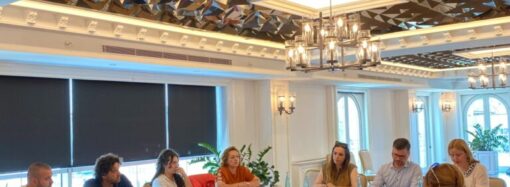On Tuesday, 20 December 2022, the third session for Working Group V (Trade and Economy Issues) on the topic “Barriers in the framework of the provision of services and the recognition of professional qualifications with the EU (Chapter 3)” was held in Shkodra. This meeting is organized under the National Convention on European Integration, which is implemented by the EMA and Slovak Foreign Policy Association (SFPA) with financial support from SlovakAid. EMA in cooperation with the Albanian National, Professional, Businesswomen and Crafts’ Association (SHGPAZ) brought together entrepreneurs, experts and members of CSOs to discuss more in detail the main challenges faced by the local service providers to join the European and international markets.
Nirvana Deliu, Coordinator at EMA, kicked off the activity with a welcoming speech and an overview of the integration process for Albania, notably on the work of the National Convention for European Integration during the years. EMA’s initiative to organize these discussion tables in cities other than Tirana, fulfills the goal to have a more comprehensive integration process, not only informing all interested parties about the latest developments but also targeting problematic areas more efficiently while also gaining valuable insights from local experts and interest groups.
Flutura Xhabija, President of SHGPAZ, followed with an address on the values and benefits of the Working Group sessions for the preparation of Albanian artisan businesses in achieving European standards in compliance with EU legislation. The work of SHGPAZ consists in supporting entrepreneurs with legislative compliance and changes, as well as to help them to adapt to the European market. In this regard, Xhabija appreciates that the national and Slovak experts at these meetings bring practical lessons that will guide and assist the businesses during the integration process as well.
Ondrej Blažo, Director of Institute of European Law at Comenius University Bratislava, was invited to this session as an expert on Chapter 3 of the EU acquis. The presentation started with an overview of the European legislation and the guarantees that uphold the freedom to provide services. Blažo cited the European Court of Justice case law, as well as the European Commission’s inspections, to point out barriers to the freedom of service provisions found in member states and other wrongful practices for Albania to refrain from. Furthermore, the expert described the Slovak experience during the EU negotiation process and how the adaptation to the European system brought benefits to local entrepreneurs and service providers, raising standards and creating other facilities, especially for regulated professions and for recognition of qualifications. Also, the expert did not fail to mention some practical lessons from Slovakia’s experience that can assist on and render Albania’s alignment process with the European legislation more efficient and fruitful.
The session concluded with an open discussion among the participants on the challenges that business operators face in providing their services domestically and abroad, as well as the lack of expertise related to these issues. The attendees brought cases from their experiences, to highlight the most important issues and to find common solutions. This discussion highlighted the need for consultations with local experts and the main actors of this sector to help break through the entry barriers of Albanian products and services in the European market.




















